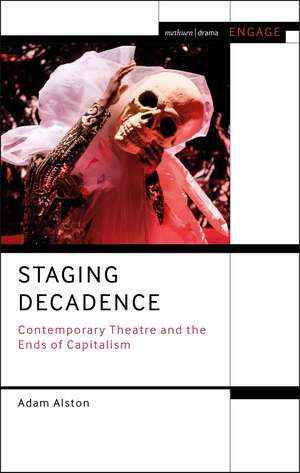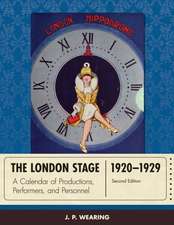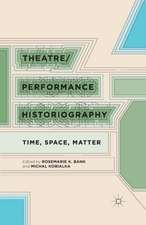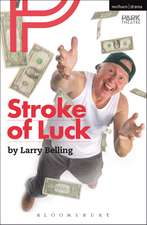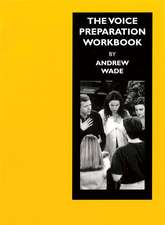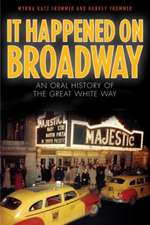Staging Decadence: Theatre, Performance, and the Ends of Capitalism: Methuen Drama Engage
Autor Adam Alstonen Limba Engleză Hardback – 4 oct 2023
Din seria Methuen Drama Engage
- 14%
 Preț: 178.65 lei
Preț: 178.65 lei - 33%
 Preț: 134.00 lei
Preț: 134.00 lei - 30%
 Preț: 508.80 lei
Preț: 508.80 lei - 21%
 Preț: 215.79 lei
Preț: 215.79 lei - 14%
 Preț: 178.65 lei
Preț: 178.65 lei - 14%
 Preț: 178.65 lei
Preț: 178.65 lei -
 Preț: 470.80 lei
Preț: 470.80 lei -
 Preț: 446.80 lei
Preț: 446.80 lei - 14%
 Preț: 179.98 lei
Preț: 179.98 lei - 22%
 Preț: 230.86 lei
Preț: 230.86 lei -
 Preț: 190.06 lei
Preț: 190.06 lei - 30%
 Preț: 537.95 lei
Preț: 537.95 lei - 30%
 Preț: 509.30 lei
Preț: 509.30 lei -
 Preț: 233.08 lei
Preț: 233.08 lei - 22%
 Preț: 232.54 lei
Preț: 232.54 lei - 30%
 Preț: 567.17 lei
Preț: 567.17 lei - 22%
 Preț: 656.47 lei
Preț: 656.47 lei - 23%
 Preț: 222.84 lei
Preț: 222.84 lei - 22%
 Preț: 231.16 lei
Preț: 231.16 lei - 30%
 Preț: 539.00 lei
Preț: 539.00 lei - 30%
 Preț: 538.09 lei
Preț: 538.09 lei - 30%
 Preț: 597.56 lei
Preț: 597.56 lei - 14%
 Preț: 178.93 lei
Preț: 178.93 lei - 30%
 Preț: 596.55 lei
Preț: 596.55 lei - 22%
 Preț: 223.85 lei
Preț: 223.85 lei - 13%
 Preț: 180.88 lei
Preț: 180.88 lei - 30%
 Preț: 566.78 lei
Preț: 566.78 lei - 13%
 Preț: 179.98 lei
Preț: 179.98 lei - 30%
 Preț: 538.26 lei
Preț: 538.26 lei - 13%
 Preț: 229.96 lei
Preț: 229.96 lei - 30%
 Preț: 539.42 lei
Preț: 539.42 lei - 23%
 Preț: 223.10 lei
Preț: 223.10 lei - 30%
 Preț: 568.06 lei
Preț: 568.06 lei - 22%
 Preț: 834.28 lei
Preț: 834.28 lei -
 Preț: 172.74 lei
Preț: 172.74 lei - 22%
 Preț: 655.50 lei
Preț: 655.50 lei
Preț: 509.02 lei
Preț vechi: 730.39 lei
-30% Nou
Puncte Express: 764
Preț estimativ în valută:
97.40€ • 101.97$ • 80.59£
97.40€ • 101.97$ • 80.59£
Carte tipărită la comandă
Livrare economică 07-21 aprilie
Preluare comenzi: 021 569.72.76
Specificații
ISBN-13: 9781350237049
ISBN-10: 1350237043
Pagini: 248
Ilustrații: 10 bw illus
Dimensiuni: 138 x 216 mm
Greutate: 0.43 kg
Editura: Bloomsbury Publishing
Colecția Methuen Drama
Seria Methuen Drama Engage
Locul publicării:London, United Kingdom
ISBN-10: 1350237043
Pagini: 248
Ilustrații: 10 bw illus
Dimensiuni: 138 x 216 mm
Greutate: 0.43 kg
Editura: Bloomsbury Publishing
Colecția Methuen Drama
Seria Methuen Drama Engage
Locul publicării:London, United Kingdom
Caracteristici
Reaches across disciplines and fields, including decadence studies, political economy, cultural theory, and the rhetorical utility of decadence in the political arena
Notă biografică
Adam Alston is Reader in Modern and Contemporary Theatre at Goldsmiths, University of London, UK. He is the co-editor of Decadent Plays, 1890-1930 (Bloomsbury, 2024), co-editor of a special issue of Volupté: Interdisciplinary Journal of Decadence Studies on 'Decadence and Performance' (Winter 2021), and he runs the AHRC-funded Staging Decadence project. He has also published extensively on immersive theatre.
Cuprins
IntroductionUselessness, wastefulness, outmodedness, and alternative productivitiesDecadence in context: from page to stageSlowdown and the pursuit of busynessWhat follows1. Zombie time: Sickness, performance, and the living dead- Interminable waiting- Zombie Time2. Para-sites and wired bodies: Decadence, scenography, and the performing body- Parasitical space: Julia Bardsley- Techno-productivism: Marcel·lí Antúnez Roca3. Alien Nation: Afropessimism, Afrofuturism, and the decadent society- 'What beasts they are': Jaamil Olawale Kosoko- Alien Nation: The Uhuruverse4. Frenetic standstill: Decadence, capitalism, and excess on the Japanese stage- Unstoppable motility: Toshiki Okada- Theatre is explosion: Toco Nikaido5. 'A dangerous form of decadence': Decadence, performance, and the culture wars- 'We should not subsidize decadence': Ron Athey- Art, outrage, and austerity: Paul McCarthy and Wunderbaum- 'A dangerous form of decadence': The war on woke6. ConclusionNotesWorks CitedIndex
Recenzii
Staging Decadence convincingly illustrates how, amid the frenzy, stagnation, and relentless productivism of present-day capitalism, artists and performers take pleasure in the ruin and waste and, far from escaping the material conditions of the modern world, imagine their way to alternatives. Alston vividly demonstrates how decadence is embodied--exuberantly, lavishly, grotesquely, wastefully, weirdly, queerly -- on the stage, in live performance, and in the work of a kaleidoscopic array of artists. No work of scholarship better demonstrates the urgency of contemporary decadence studies and will speak to multiple audiences in theatre, performance, disability studies, literature and art. Alston shows us what it is to live and breathe along with the artists whose work he so carefully illuminates. As it explores the counter-pleasures offered by contemporary decadent performance, Staging Decadence is as pleasurable and exciting to read as it is intelligent in its critique of twenty-first century capital.
